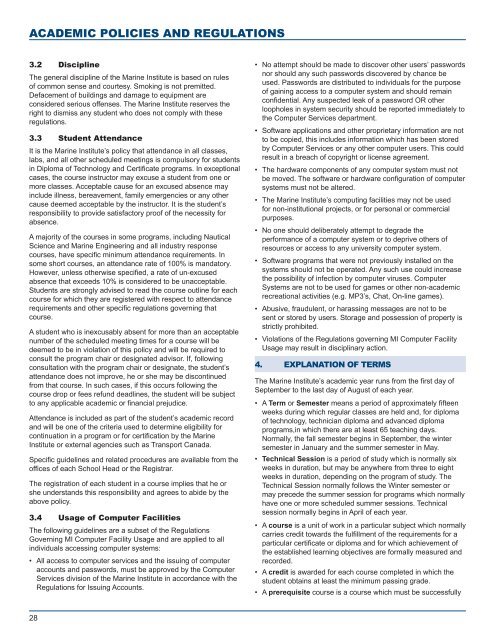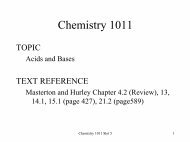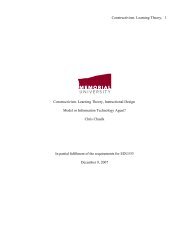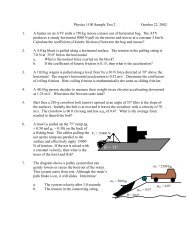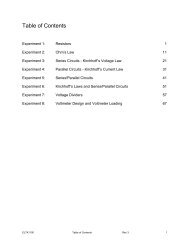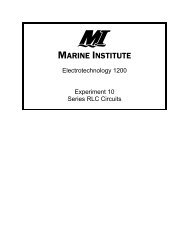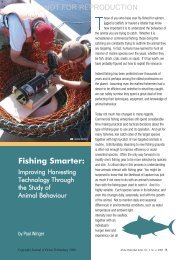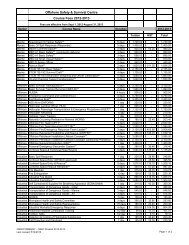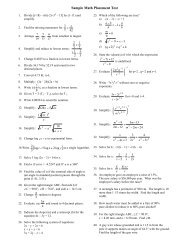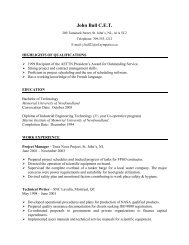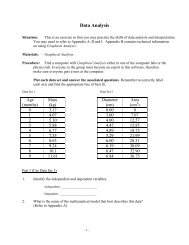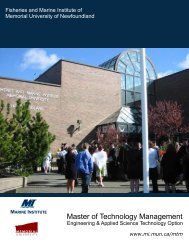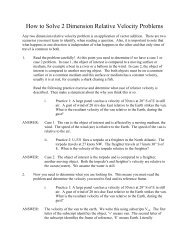Academic Calendar - Fisheries and Marine Institute - Memorial ...
Academic Calendar - Fisheries and Marine Institute - Memorial ...
Academic Calendar - Fisheries and Marine Institute - Memorial ...
Create successful ePaper yourself
Turn your PDF publications into a flip-book with our unique Google optimized e-Paper software.
ACADEMIC POLICIES AND REGULATIONS<br />
3.2 Discipline<br />
The general discipline of the <strong>Marine</strong> <strong>Institute</strong> is based on rules<br />
of common sense <strong>and</strong> courtesy. Smoking is not premitted.<br />
Defacement of buildings <strong>and</strong> damage to equipment are<br />
considered serious offenses. The <strong>Marine</strong> <strong>Institute</strong> reserves the<br />
right to dismiss any student who does not comply with these<br />
regulations.<br />
3.3 Student Attendance<br />
It is the <strong>Marine</strong> <strong>Institute</strong>’s policy that attendance in all classes,<br />
labs, <strong>and</strong> all other scheduled meetings is compulsory for students<br />
in Diploma of Technology <strong>and</strong> Certificate programs. In exceptional<br />
cases, the course instructor may excuse a student from one or<br />
more classes. Acceptable cause for an excused absence may<br />
include illness, bereavement, family emergencies or any other<br />
cause deemed acceptable by the instructor. It is the student’s<br />
responsibility to provide satisfactory proof of the necessity for<br />
absence.<br />
A majority of the courses in some programs, including Nautical<br />
Science <strong>and</strong> <strong>Marine</strong> Engineering <strong>and</strong> all industry response<br />
courses, have specific minimum attendance requirements. In<br />
some short courses, an attendance rate of 100% is m<strong>and</strong>atory.<br />
However, unless otherwise specified, a rate of un-excused<br />
absence that exceeds 10% is considered to be unacceptable.<br />
Students are strongly advised to read the course outline for each<br />
course for which they are registered with respect to attendance<br />
requirements <strong>and</strong> other specific regulations governing that<br />
course.<br />
A student who is inexcusably absent for more than an acceptable<br />
number of the scheduled meeting times for a course will be<br />
deemed to be in violation of this policy <strong>and</strong> will be required to<br />
consult the program chair or designated advisor. If, following<br />
consultation with the program chair or designate, the student’s<br />
attendance does not improve, he or she may be discontinued<br />
from that course. In such cases, if this occurs following the<br />
course drop or fees refund deadlines, the student will be subject<br />
to any applicable academic or financial prejudice.<br />
Attendance is included as part of the student’s academic record<br />
<strong>and</strong> will be one of the criteria used to determine eligibility for<br />
continuation in a program or for certification by the <strong>Marine</strong><br />
<strong>Institute</strong> or external agencies such as Transport Canada.<br />
Specific guidelines <strong>and</strong> related procedures are available from the<br />
offices of each School Head or the Registrar.<br />
The registration of each student in a course implies that he or<br />
she underst<strong>and</strong>s this responsibility <strong>and</strong> agrees to abide by the<br />
above policy.<br />
3.4 Usage of Computer Facilities<br />
The following guidelines are a subset of the Regulations<br />
Governing MI Computer Facility Usage <strong>and</strong> are applied to all<br />
individuals accessing computer systems:<br />
• All access to computer services <strong>and</strong> the issuing of computer<br />
accounts <strong>and</strong> passwords, must be approved by the Computer<br />
Services division of the <strong>Marine</strong> <strong>Institute</strong> in accordance with the<br />
Regulations for Issuing Accounts.<br />
• No attempt should be made to discover other users’ passwords<br />
nor should any such passwords discovered by chance be<br />
used. Passwords are distributed to individuals for the purpose<br />
of gaining access to a computer system <strong>and</strong> should remain<br />
confidential. Any suspected leak of a password OR other<br />
loopholes in system security should be reported immediately to<br />
the Computer Services department.<br />
• Software applications <strong>and</strong> other proprietary information are not<br />
to be copied, this includes information which has been stored<br />
by Computer Services or any other computer users. This could<br />
result in a breach of copyright or license agreement.<br />
• The hardware components of any computer system must not<br />
be moved. The software or hardware configuration of computer<br />
systems must not be altered.<br />
• The <strong>Marine</strong> <strong>Institute</strong>’s computing facilities may not be used<br />
for non-institutional projects, or for personal or commercial<br />
purposes.<br />
• No one should deliberately attempt to degrade the<br />
performance of a computer system or to deprive others of<br />
resources or access to any university computer system.<br />
• Software programs that were not previously installed on the<br />
systems should not be operated. Any such use could increase<br />
the possibility of infection by computer viruses. Computer<br />
Systems are not to be used for games or other non-academic<br />
recreational activities (e.g. MP3’s, Chat, On-line games).<br />
• Abusive, fraudulent, or harassing messages are not to be<br />
sent or stored by users. Storage <strong>and</strong> possession of property is<br />
strictly prohibited.<br />
• Violations of the Regulations governing MI Computer Facility<br />
Usage may result in disciplinary action.<br />
4. EXPLANATION OF TERMS<br />
The <strong>Marine</strong> <strong>Institute</strong>’s academic year runs from the first day of<br />
September to the last day of August of each year.<br />
• A Term or Semester means a period of approximately fifteen<br />
weeks during which regular classes are held <strong>and</strong>, for diploma<br />
of technology, technician diploma <strong>and</strong> advanced diploma<br />
programs,in which there are at least 65 teaching days.<br />
Normally, the fall semester begins in September, the winter<br />
semester in January <strong>and</strong> the summer semester in May.<br />
• Technical Session is a period of study which is normally six<br />
weeks in duration, but may be anywhere from three to eight<br />
weeks in duration, depending on the program of study. The<br />
Technical Session normally follows the Winter semester or<br />
may precede the summer session for programs which normally<br />
have one or more scheduled summer sessions. Technical<br />
session normally begins in April of each year.<br />
• A course is a unit of work in a particular subject which normally<br />
carries credit towards the fulfillment of the requirements for a<br />
particular certificate or diploma <strong>and</strong> for which achievement of<br />
the established learning objectives are formally measured <strong>and</strong><br />
recorded.<br />
• A credit is awarded for each course completed in which the<br />
student obtains at least the minimum passing grade.<br />
• A prerequisite course is a course which must be successfully<br />
28


